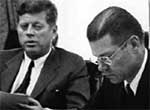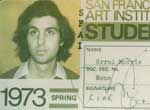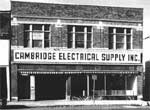Errol Morris makes brainy, utterly original films. Just don't call them documentaries.
By David Ansen
Newsweek - October, 20, 1997
Errol Morris likes to describe his newest movie, Fast, Cheap and Out of Control, as "the ultimate low-concept movie -- a film that utterly resists the possibility of a one-line summary." Trying to define any Errol Morris movie is a slippery business. This obsessive, cerebral, cosmically ironic filmmaker makes one-of-a-kind movies that are often filed under the category "documentary," a rubric that doesn't begin to grapple with their singularity.
His best-known film, "The Thin Blue Line," an investigation into a Texas crime that resulted in the release of a man wrongly convicted of murder, is the easiest to buttonhole; but even there Morris mixed real interviews with simulated re-enactments, blurring the line between fact and fiction. Morris's interviews, in which his subjects speak straight into the camera, have a spookily formal quality that's all his own. This style was evident in his amazing first feature, "Gates of Heaven." Ostensibly about pet cemeteries, its true subject was American speech: we got to know the inner lives of the family that ran the cemetery by how they revealed themselves, and their dreams, through language. In his brilliantly bizarre "Vernon, Florida," the talkers are a gaggle of Southern eccentrics; in "A Brief History of Time," the subject is the physicist Stephen Hawking, who, unable to talk because of his disease, types words that are translated into speech by a computer.
A great listener, this former philosophy student is stalking big game. Concerned with epistemological issues -- how do we know what we know? -- his brainy, haunting films deliberately fudge the line between actuality and fantasy because Morris himself sees the world as an unstable mixture of the two. The 49-year-old filmmaker is haunted by a question. "How much of the world is our dream of the world, and how much is it itself?" That's why he hates to be called a documentary filmmaker. "My gripe isn't with cinema verite. It's the metaphysical claim -- the idea that style guarantees truthfulness -- which I find repellent." Morris's nonfiction films don't pretend to be "capturing" reality: they're probing and poking at it, like a doctor looking for a surface aberration that will reveal an inner secret.
In the mysterious and beautiful "Fast, Cheap and Out of Control," Morris interviews four seemingly disparate men -- a topiary gardener whose Sisyphean labors (15 years to create a bear!) could be erased by a single storm; a scientist who studies mole rats as an act of self-investigation; a lion tamer who idolizes Clyde Beatty, and a robot scientist who envisions a future in which carbon-based life is replaced by silicon-based forms of life. Each of these obsessive men is fascinating in his own right, but it's the juxtapositions and connections that Morris creates -- mixing his interviews with circus footage, a cheesy old Clyde Beatty jungle movie, the mole rats at work, lion-taming acts -- into a collage of animal, human and mechanical images that sets off intellectual fireworks in your head.
Made after the death of his mother and stepfather, it has an elegiac undercurrent that's new in Morris's work -- a sense of mortality and loss that anchors its heady playfulness in real feeling. "I had a poem by William Butler Yeats in mind when I made it," Morris says. "The lines in 'Lapis Lazuli': 'All things fall and are built again/And those that build them again are gay.' It's the idea of the hopelessness of it all, but a surviving nobility notwithstanding."
Morris, who lives in Cambridge, Mass., with his wife and son, made one ill-fated journey into purely narrative cinema: an adaptation of the Tony Hillerman novel "The Dark Wind" for Robert Redford's company. It went straight to video. But he'd like to return to fiction films. One of his long-cherished projects, "The Trial of King Boots," is a true story about a sheep dog in Michigan that was put on trial for murder. He also has hopes of developing a series of bizarre, half-hour, fact-based episodes for TV that will employ his invention, the Interrotron. That is his name for the camera he devised that allows his subjects to look directly into the lens while seeing Morris's face as he interviews them. "Fast, Cheap" was shot this way, and he refers to it as "the first true first-person movie." It's Morris's way of saying, "I am a camera." But he is a camera like no other: what he sees are the things no one else would dream of looking for.
The Philosopher King
REVIEWS/ARTICLES
Todd McCarthy (Fog of War)
Fred Kaplan (Fog of War)
Samantha Power (Fog of War)
Ron Rosenbaum (Fog of War)
Kenneth Turan (Fog of War)
Peter Applebome (Mr. Death)
Ron Rosenbaum (Mr. Death)
Todd McCarthy (Fast, Cheap & Out of Control)
Roger Ebert (The Thin Blue Line)
Terrence Rafferty (The Thin Blue Line)
Janet Maslin (Vernon, Florida)
Alan Berger (Gates of Heaven)
Michael Covino (Gates of Heaven)
Roger Ebert (Gates of Heaven)
MORE FAST, CHEAP
Synopsis
Transcript
Gallery
Watch Clip
BUY THIS MOVIE
Amazon
OTHER FILMS
Gates of Heaven
Vernon, Florida
The Thin Blue Line
A Brief History of Time
Mr. Death
The Fog of War
Standard Operating Procedure
Tabloid
The Unknown Known
The B-Side
Wormwood American Dharma







